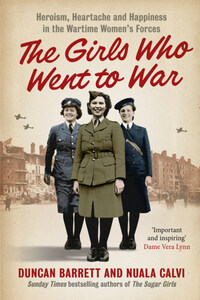As the 8.10 to Charing Cross pulled out of Woolwich, Sylvia Bradley could barely contain her excitement. At fifteen and a half, she had only just left school, and was thrilled to be joining the crowds of glamorous women who took the train ‘Up West’ every morning to work in the capital’s grand hotels and shops. Her blonde hair had been perfectly curled for the occasion, and her brand-new lipstick applied.
If Sylvia’s mother had got her way, she wouldn’t have been there at all. A talented seamstress, Mrs Bradley had been a furrier before the war, working from home sewing the false eyes and noses on fox furs for a West End shop. Applying the wartime philosophy of make-do-and-mend, these days she prided herself on keeping her family well turned out, despite clothes rationing, by finding old garments in second-hand shops and working miracles on them so that they looked brand new. She had easily found her eldest daughter a position with a local tailor in East London, sewing trouser hems.
But Sylvia, who had grown up surrounded by the fox furs that her mother took in and hearing about the fashionable shops where they were sold, dreamed of one day working in the West End. She couldn’t help admiring Dolly Stickens, who lived on the next road over, and who her mother sometimes did sewing work for. Dolly worked in the Piccadilly Hotel, and every day she set off for town looking incredibly smart, her face well made-up.
‘Look at her, at her age, wearing all that make-up!’ Sylvia’s mother tutted. Mrs Bradley would never have rouged her face, let alone dyed her hair a shocking red like Dolly’s.
But to Sylvia, the other woman looked like a movie star.
Dolly’s job was selling theatre tickets from a little kiosk at the Piccadilly, and one day she heard that the hotel was looking for a couple of young women for the billing office. ‘Perhaps your Sylvie might be interested,’ she said.
‘Oh, no, she wouldn’t want to work so far away,’ Mrs Bradley said dismissively.
Sylvia saw her chance drifting away and quickly piped up. ‘I wouldn’t mind. I think I’d like it.’
‘Well, I’ll put in a word for you then,’ said Dolly with a smile. ‘Ta-ra!’ She was gone before Mrs Bradley had a chance to protest.
Sylvia was ecstatic when, a few days later, Dolly gave her the news that she was to be given a trial period as a comptometer operator. She had no idea what that meant, but she didn’t care. All she knew was that she would be joining the stylish women who headed into town every morning.
When she arrived at Charing Cross, Sylvia was almost knocked over in the fray as everyone bustled off the train and hurried to the exit. She had only been into central London once before, when she was a child and her father had taken her to Madame Tussauds. Although she was older now, she was still struck by how big everything was, and how busy it felt compared to Woolwich.
Dolly had given Sylvia written instructions for getting the bus up to Piccadilly, which she followed carefully, finally alighting outside the hotel’s grand Palladian façade. The billing office was up a little spiral staircase at the side, and when she arrived a rather intimidating manageress called Miss Frank showed her how to clock in with a card. Then she sat Sylvia down in the office and explained how to use the comptometer – which turned out to be an adding machine for processing the hotel’s bills.
Sylvia did her best to listen, but her attention was caught by a large half-moon window that overlooked the street. Below, Mayfair thronged with exotic-looking men, from Free French and Polish soldiers to various foreign dignitaries.
‘Here comes our maharaja!’ one girl shouted, and all the others ran to the window, as a handsome Sikh in a bright-blue turban walked past.
‘Comes past the same time every day,’ said a girl called Peggy, who sat at the desk next to Sylvia’s. ‘I reckon he’s got a princess hidden away in one of the hotels who he goes to visit secretly.’
‘Back to work, girls,’ Miss Frank said, and they all returned to their machines.
Over the course of the day, Sylvia learned that the people-watching was considered the best part of the job at the Piccadilly, and took up much of the girls’ time. And increasingly, it was Americans who were the main players in the movie unfolding outside their window, as the whole area was taken over by the soldiers of the ‘friendly invasion’.












